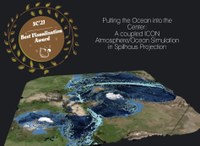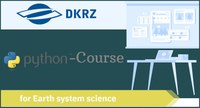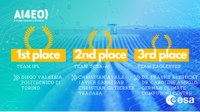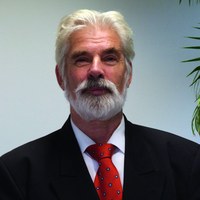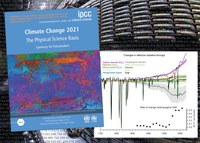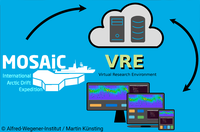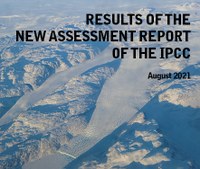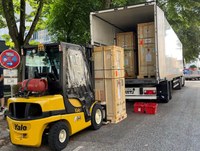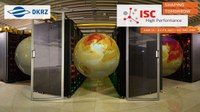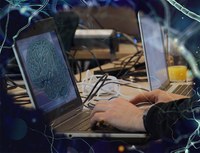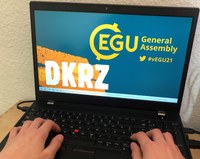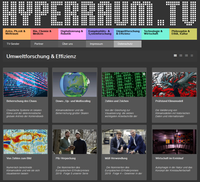SC'21 Best Visualization Award for DKRZ, MPI-M, University Stockholm, and Intel Corporation
A joint team of the German Climate Computing Centre (DKRZ), the Max Planck Institute for Meteorology (MPI-M), the Stockholm University, and the Intel Corporation has won the SC'21 Best Scientific Visualization & Data Analytics Showcase Award for their visualization “Putting the Ocean into the Center: A coupled ICON Atmosphere/Ocean Simulation in Spilhaus Projection”.
EGU Early Career Award for Christopher Kadow
The renowned "Outstanding Early Career Scientists Award" in the division of "Earth and Space Science Informatics" of the European Geoscience Union (EGU) goes to Dr. Christopher Kadow from the DKRZ in Hamburg. The prize honors young scientists who have distinguished themselves through excellent scientific achievements in the first few years after their doctorate and is one of the most important European prizes that young scientists can receive.
ML workshop in cooperation with Nvidia and NetApp at the DKRZ
On October 28, 2021, junior research group leaders Dr. Christopher Kadow and Helmholtz AI team leader Dr. Tobias Weigel in cooperation with the companies NVIDIA and NetApp have run an internal machine learning (ML) workshop.
Python course for Earth system science at the DKRZ
From October 26 to 29, 2021, DKRZ offered an online Python course for its users for the first time. The tutor team (Marco Kulüke, Karin Meier-Fleischer, Ralf Müller and Fabian Wachsmann from DKRZ and Jannek Squar from the University of Hamburg) received positive feedback from the 20 participants from different fields of geosciences.
DKRZ team on rank 3 in ML Challenge
In the second "AI4Sentinel2 challenge", Frauke Albrecht and Caroline Arnold of the Helmholtz AI support team HAICU / AIM at DKRZ achieved the third place as the team "EagleEyes".
Nobel Prize in Physics for Prof. Klaus Hasselmann, co-founder and long-time scientific director of DKRZ!
For his contributions to the physical modeling of the Earth's climate, the quantification of natural variability, and the reliable prediction of global warming, Prof. Klaus Hasselmann, founding director of the Max Planck Institute for Meteorology and scientific director of DKRZ from 1987-1999, receives the Nobel Prize 2021 in Physics jointly with Syukuro Manabe (USA) and Giorgio Parisi (Italy).
FAIR data for the Sixth IPCC Assessment Report
In the recently published first part of the Sixth Assessment Report (AR6) of the Intergovernmental Panel on Climate Change (IPCC), data documentation has been significantly improved compared to previous reports.
A virtual laboratory for the MOSAiC data
The new project "M-VRE: The MOSAiC - Virtual Research Environment" aims to make it easier for researchers to use and analyze data from MOSAiC, the largest Arctic research expedition to date (09/2019-10/2020).
New IPCC report: Humans have clearly warmed the climate
The just-released, first part of the Sixth Assessment Report (AR6) of the IPCC once again demonstrates, more clearly than before, that human-induced greenhouse gas emissions are primarily responsible for global warming and observed climate change. While concentrations of greenhouse gases have continued to increase, the atmosphere and ocean have continued to warm over the past decade, snow and ice levels have continued to decline, and global sea levels have continued to rise.
DKRZ@PASC21
This year's Platform for Advanced Scientific Computing (PASC) conference, in which the DKRZ team is participating with a number of activities, will be held in digital format from July 5-9, 2021. The PASC conference series provides an international and interdisciplinary platform for exchange in scientific computing with a strong focus on methodology, tools, algorithms, application challenges, novel techniques, as well as applications of high-performance computing.
Delivery and installation of new supercomputer Levante has started
On July 6, 2021, the first truck rolled up to the doors of DKRZ - on board, among other things, ten boxes weighing several tons with the first racks of the new climate supercomputer "Levante". Further deliveries and assembly will take place over the coming weeks.
NFDI4Earth enables interdisciplinary access to research data
On July 2, 2021, the Joint Science Conference (Gemeinsame Wissenschaftskonferenz – GWK) of the Federal Government and the Heads of Government of the German states approved funding for NFDI4Earth and nine other NFDI consortia. The National Research Data Infrastructure (NFDI) aims at an easy, secure and systematic access to data from science and research, a more widely availability and international data network. DKRZ was one of the co-applicants for NFDI4Earth, which addresses a joint and sustainable research data management for the earth system sciences.
DKRZ@ISC21 Digital
From June 24 to July 2, the largest scientific HPC conference in Europe, ISC High Performance, will take place. Both the conference and the parallel exhibition will once again be held in digital format and will be dedicated to innovations and applications in HPC, networking and storage technologies. This year's ISC21 Digital will focus on: Artificial Intelligence, Machine Learning and Deep Learning, emerging technologies such as Cloud and Quantum Computing, HPC algorithms and applications, programming environments and performance modeling. DKRZ will present itself as one of 82 exhibitors with a virtual booth at ISC21 Digital.
Hamburg Climate Futures Outlook 2021: Deep Decarbonization by 2050 currently not plausible
The Hamburg-based Cluster of Excellence “Climate, Climatic Change, and Society” (CLICCS) publishes the results of the new, essential study on climate futures that systematically investigates whether a climate future with net-zero carbon emissions is not only possible but also plausible.
Workshop insights: Machine learning for earth systen modeling and analytics
With about 200 participants contributing on applied machine learning methods for modelling and analysis of Earth systems, the workshop was a great success.
DKRZ at #vEGU21
From April 19 to 30, 2021, the online gathering event #vEGU21 will take place for the second time completely virtually in place of the General Assembly of the European Geosciences Union (EGU) in Vienna. Under the motto "Engage - Discover - Inspire", geoscientists from all over the world will meet and exchange information about developments, research results, projects and ideas from all disciplines of earth, planetary and space sciences. DKRZ presents numerous activities at this year's #vEGU21.
Online training on Data Analytics
On March, 8th and 9th, 2021 an online training on data analytics will take place being jointly organized within the H2020 projects IS-ENES3 and EOSC-Hub. The event is open to everyone - mainly targeting Earth system science and data science - interested in processing multidimensional data using the new service ECAS (short for: ENES Climate Analytics Service).
Contract Signing for Exabyte Data Archive at DKRZ
On February 10, 2021, Prof. Thomas Ludwig, Managing Director of DKRZ, and Volker Wester, Managing Director of Cristie Data, signed a contract for the delivery and service of a new Hierarchical Data Management (HSM) system.
Video series on climate modeling on HYPERRAUM.TV
In November and December 2020, the German platform for science and technology HYPERRAUM.TV published a five-part video series on fundamental questions about climate modeling and research. The short videos conceived by the journalist Susanne Päch have been created in cooperation with the DKRZ, the Cluster of Excellence CLICCS / Center for Earth System Research and Sustainability (CEN) at the University of Hamburg, the European Space Agency ESA, and the US Federal Agency for Space and Aviation NASA or the University of Hanover.
New publication about Reproducibility and regional climate models
Although current reporting gives the impression that climate research only focuses on climate change and its consequences, there are also aspects that are independent of this, as this article shows. It is about the indeterminacy of the development of the dynamic state of the atmosphere.
Heating with waste heat recovery
Climate protection in Bundesstrasse 45 and 45a looks like this: The supercomputer Mistral in the German Climate Computing Center produces heat and the neighboring Institute for Technical and Macromolecular Chemistry (TCM) at the University of Hamburg has been using this waste heat for its chemistry laboratories for one year now.

